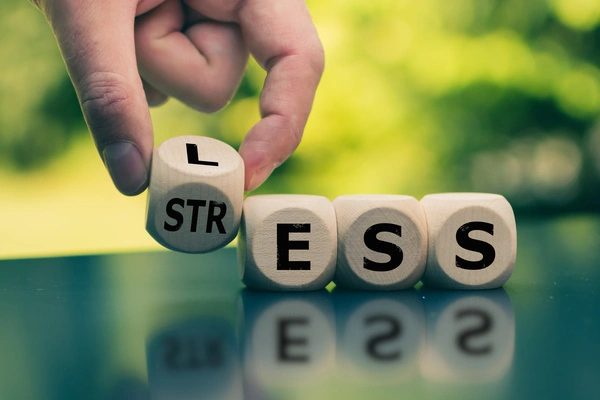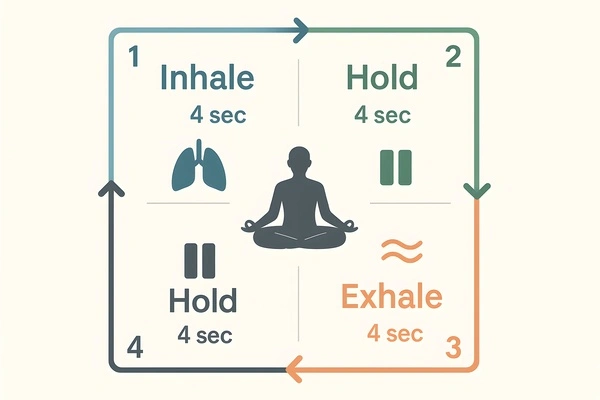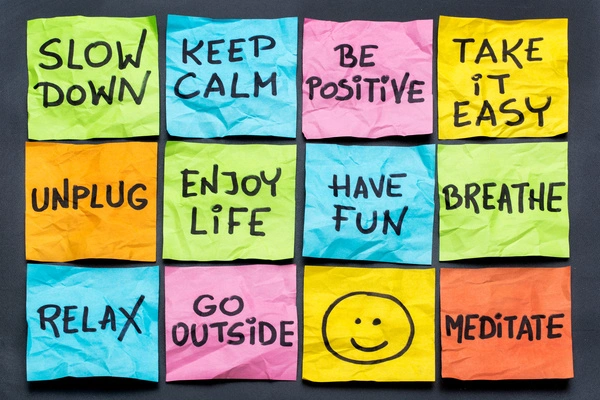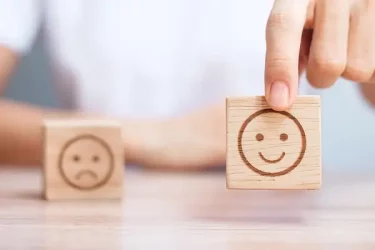Estimated reading time: 6 minutes
If you’ve ever laid awake at night and struggled to sleep due to racing thoughts and an overactive mind, this tips for staying calm article might be just the ticket!
Over the course of this blog, we look at what makes us anxious, how the body responds to stress, and how we can work to stay calm in difficult situations.

Why do we struggle to stay calm?
When the going gets tough do you get sweaty palms? Can you feel your stress levels rising in a room full of noise and angry people? If you answered yes to either of those stress-filled scenarios, congratulations: you can consider yourself normal!
That’s because, as humans, we’re hard-wired to feel stress (and exhibit physical symptoms of stress) when put under pressure. It’s the body’s natural response going all the way back to a time before Deliveroo when surviving to the end of the day was the main goal. But why? Let’s take a look.
The body’s response to stress
Stress is all part of our ‘inner caveman’ response system called ‘fight or flight’. When we’re faced with a stressful situation, our body’s instinct is to react either by fighting or running away. While this tried and tested method has successfully kept us humans alive and kicking for thousands of years, overexposure to this response can cause serious mental and physical health issues.
Common situations that trigger stress
Back in the day, the struggle for our ancestors was, as the kids say, real. If they weren’t busy trying to stay warm or fighting off other cave-dwelling clans, they were struggling to satisfy hunger – a daily cause of stress.
Luckily, the advent of supermarkets means we don’t have to fight to the death for a sandwich but there are other stresses that have replaced those prehistoric perils.
Finances, work, raising kids, relationships, low self-esteem, and too much exposure to social media are among the leading causes of stress of the modern day. Stress is normally triggered as a response to these factors placing more demand on us than we can meet.
Generational stress
- The leading cause of stress for those aged 18-54 are finances
- People over the age of 65 are more likely to be stressed by their health and current affairs than any other age group
- 23% of those aged 18-24 report being stressed out by social media whereas only 4% of those aged 65+ experience the same
Statistics taken from a 2024 report by Ciphr
How to stay calm in stressful situations
Picture the scene: your doctor has recommended you get an MRI scan to help diagnose a specific issue. You’re lying in the MRI scanner, it’s a tight space, you’ve been instructed to keep movement to a minimum, and it’s extremely noisy. It’s a scenario to increase anyone’s stress levels but are there any calming strategies that would actually work? The sections below explore ways of staying calm in a range of stressful situations.
Deep breathing exercises
It might sound a bit obvious but concentrating on your breathing is a great way to activate your body’s relaxation response. The next time you feel anxious or stressed out, this exercise might help you:

Movement and stretching
Exercise has long been hailed as a great way of reducing stress. This is because physical activity releases endorphins which are natural mood-boosters and pain relievers. Walking, yoga, and stretching are also not only good for your physical wellbeing but work wonders as stress relief spaces to clear your head.
Using your senses to calm down quickly
Engaging your senses can be an effective way of grounding yourself and distracting your mind from whatever is currently causing you to feel stressed. Listening to music that means something to you, getting outside and enjoying nature, and even taking a warm bath are all relaxation techniques you can use to help calm you down quickly.
The main causes of stress for UK adults
- The leading cause of stress for UK adults is not getting enough sleep (41%)
- 32% of UK adults report being stressed by their health
- 38% indicate feeling stressed out by financial concerns
Statistics taken from a 2024 report by Ciphr
Healthcare and anxiety: how to stay calm during your medical journey
We’ve all been there: you’re minutes away from giving an important presentation at work and every big fish in the company is about to scrutinise every word. Your heart is pounding and your palms are sweatier than if you’d just finished a circuits class. So, how can you stay calm under this kind of pressure? Well, let’s see!
Staying calm before a medical appointment
Lots of people would rather skip their next hospital or dental appointment to avoid having to experience the associated anxiety. But what if we told you there are ways of reducing anxiety before your next medical appointment?
The following can really help you to de-stress and feel more in control of the experience:
- understand what’s going to happen during your appointment or procedure
- make sure your doctor or consultant is trusted
- read reviews about the hospital or medical centre you’re visiting
- follow any pre-appointment instructions to prepare
- share your feelings with a friend, family member, or even a professional.
Tips for staying calm at work
We spend a huge proportion of our lives at work, so it makes sense that our worklives should be as stress-free as possible. Unfortunately, as we all know, it doesn’t always work that way and difficult colleagues, tight deadlines, and overwhelming workloads can all contribute to increased stress levels.
One tip for staying calm at work is to identify the cause of the stress. For example, if you have a demanding work schedule that’s threatening to get out of control, a chat with your manager should be just what’s needed to help you. Taking regular breaks is another way of taking the sting out of rising stress levels. The physical disconnection from your screen and desk can work wonders in helping you to recharge.
What NOT to do when you’re trying to calm down
We’ve covered advice and tips for when it comes to managing stress. Now it’s time to look at the habits to avoid making your stress symptoms even worse.
Avoid numbing behaviours
After a tough week at work, there are few more appealing thoughts than relaxing with a cold pint or glass of wine. And while alcohol has its place in the arsenal of stress management tools, overreliance can lead to bad habits.
You’ve likely read about the mental and physical perils of binge drinking but here’s a reminder. According to a scientific study about binge drinking the effects can include:
- increased blood pressure levels
- increased risk of heart attack
- stunting of brain development (in younger adults)
- increased tendency to make poor decisions.
In all, relying on alcohol as a stress reliever can actually have the reverse effect over a long period, serving to increase stress-related symptoms.

Is it anxiety or just stress?
While both stress and anxiety fall under the same umbrella of mental health terms, and are sometimes used to describe similar (or sometimes the same!) experiences, there are distinct differences.
Below we explore what these are.
How to tell the difference
For one, while anxiety is a general feeling of unease or worry, stress is a reaction to an external pressure or demand. Stress is also more likely to be short term, whereas anxiety can be a persistent condition, sometimes without a clear cause.
Unlike anxiety, stress isn’t necessarily always negative. Sometimes stress can be used to cope or even improve performance in the face of tight deadlines or public speaking. Anxiety, on the other hand, can lead to a lack of focus and debilitating worry.
FAQs: Staying calm and stress relief
Not quite found the information you’re looking for? Our dedicated stress relief FAQs can help!
Breathing techniques are a great way to quickly calm down. Breathe in for four seconds, hold that breath for four more seconds, exhale for four more seconds and then wait four more seconds before repeating the exercise.
While they won’t be as effective for everyone, calming techniques are a proven way of reducing the symptoms of stress. As with most things in life, practice makes perfect!
As with many things in life, practice makes perfect. So, if you still feel the symptoms of anxiety or stress after trying calming techniques, it’s important to give it another go. If the calming techniques really aren’t working and you’re getting increasingly overwhelmed, spending some time with a stress management specialist may be a good idea.
Yes, it absolutely is! It doesn’t matter if you’re in the middle of an MRI scan or a meeting at work, if you recognise the need to take a break, then do so.





